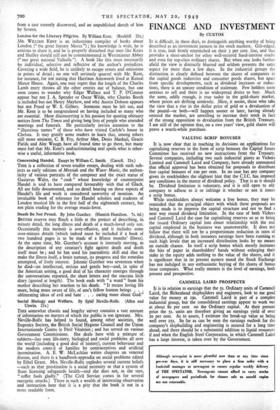FINANCE AND INVESTMENT
By CUSTOS
IT is difficult, in these days, to distinguish anything worthy of being described as an investment pattern in the stock markets. Gilt-edged, it is true, look firmly entrenched on their 3 per cent, line, and that provides a sheet-anchor for other well-secured fixed-interest stocks and even for top-class ordinary shares. But when one looks further afield the view is distinctly blurred and seldom presents the same aspect for more than a few days. In the industrial groups the distinction is clearly defined between the shares of companies in the capital goods industries and consumer goods shares, but apart from specific developments, such as dividend increases or reduc- tions, there is an uneasy condition of stalemate. Few holders seem anxious to sell and there is no widespread desire to buy. Much the same, oddly enough, is true today in the gold-share market, where prices are drifting aimlessly. .Here, it seems, those who take the view that a rise in the dollar price of gold or a devaluation of the pound—or both—will happen sooner or later, having already entered the market, are unwilling to increase their stock in face of the strong opposition to devaluation from the British Treasury. I am still of the opinion that, on a two years' view, gold shares will prove a worth-while purchase.
VALUING SCRIP BONUSES It is now clear that in reaching its decisions on applications for capitalising reserves in the form of scrip bonuses the Capital Issues Committee has received no new instructions from the Treasury. Several companies, including two such industrial giants as Vickers Limited and Cammell Laird and Company, have already announced that official approval has been obtained for proposals to distribute free capital bonuses of too per cent. In no case has any company given its stockholders the slightest hint that the C.I.C. has imposed any conditions in the matter of dividend policy. That is as it should be. Dividend limitation is voluntary, and it is still open to any company to adhere to it or infringe it whether or not it issues a scrip bonus.
While stockholders always welcome a free bonus, they may be reminded that the principal object with which these proposals are being made is to improve the capital structure and not to find a neat way round dividend limitation. In the case of both Vickers and Cammell Laird the case for capitalising reserves so as to bring the issued Ordinary capital into closer relationship with the real capital employed in the business was unanswerable. It does not follow that there will not be a proportionate reduction in rates of dividend, although in both instances earnings have been running at such high levels that an increased distribution looks by no means an outside chance. In itself a scrip bonus which merely increases the bits of paper in shareholders' hands without enlarging their stake in the equity adds nothing to the value of the shares, and it is significant that in its present austere mood the Stock Exchange has not indulged in any enthusiastic buying of the shares of bonus issue companies. What really matters is the level of earnings, both present and prospective.
CAMMELL LAIRD PROSPECTS It is in relation to earnings that the 5s. Ordinary units of Cammell Laird, the Birkenhead shipbuilders and engineers, look to me good value for money at 19s. Cammell Laird is part of a complex industrial group, but the consolidated earnings appear to work out at about 8o per cent on the Ordinary capital. At their present price the 5s. units are therefore giving an earnings yield of over 20 per cent. As to assets, I estimate the break-up value as being well over 25s. So far as can be seen the earnings outlook for the company's shipbuilding and engineering is assured for a long time ahead, and there should be a substantial addition to liquid resources if and when the English Steel Corporation, in which Cammell Laird has a large interest, is taken over by the Government.










































 Previous page
Previous page